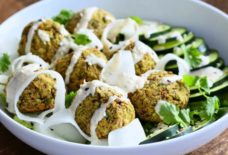Two Bakers Thrive in Brooklyn, Far From Syria’s Turmoil
By TEJAL RAO
THE NEW YORK TIMES
Marhaf Homsi was not impressed with the baklava situation in New York.
The pastries were too sweet for his taste, and there was often a filler like semolina mixed in with the nuts. The nuts themselves were pulverized and powdery, ruining the texture of the confection.
“Baklava has delicate feelings,” said Mr. Homsi, 76. He stood in his small kitchen in Bay Ridge, Brooklyn, waving the creases out of sheer, supple phyllo dough.
Before he and his wife, Nawal Wardeh, fled Syria last year, the couple owned a bakery in the city of Hama for more than 30 years. They have sold their Syrian sweets, including baklava, at outdoor markets in New York, and have just started a website, Syrian Sweet Refuge, for online sales. They plan to rent an industrial kitchen in Sunset Park for large orders.
Back in Hama, the pair also baked bread, cookies and wedding cakes. When the government cut off their supplies of flour or butter, they, like other Syrians caught in the war, struggled to get on with their lives and their work.
They adapted, baking whatever they could with the ingredients on hand, sometimes making purchases on the black market. A stack of cookies or even a few crackers would signal that the bakery was open amid chaos. “We always wanted to keep something in the windows,” Ms. Wardeh said.
When refugees arrived from other parts of the country, the couple did their best to feed them. When bullets pierced the windows, Mr. Homsi said, they slept on the floors to stay safe. And when the city became too dangerous, they left Hama, where they had both grown up before they were married, raised four children and started their business.
They arrived in the United States last March on permanent resident visas, living at first with one of their sons, a rheumatologist in Albany. They felt safe, but had little to do.
“We like to stay busy,” said Ms. Wardeh, 69.
Mr. Homsi took walks that lasted many hours. And he baked tray after tray of baklava filled with walnuts. Ms. Wardeh made issheh from the skimmed top of heated and cooled milk, a specialty of bakers in Hama. Pressed, it takes on the texture of a tender, fresh cheese.
The couple have two sons in the United States and two in the Middle East. Their youngest, Zaher Homsi, who had dropped out of high school to run the family bakery in Hama, was recently approved for refugee processing.
He was waiting for a second interview in Abu Dhabi with his wife and child when President Trump signed an executive order late last month barring immigrants from Syria, along with six other nations. Family members aren’t sure when they’ll be reunited.
While they wait for a definitive court ruling on the order, Mr. Homsi focuses on his baklava. He chops the walnuts by hand to maintain their crunch, and seasons them with just a touch of powdered sugar and orange blossom water.
He is careful not to let any excess water into the pastry — this means using clarified butter and carefully airing out each sheet of phyllo before layering it. Or, as Mr. Homsi put it, giving the dough a chance to breathe.
Their small, tidy kitchen in Bay Ridge smelled of butter and boiling coffee, and in the pauses of conversation, you could hear the edges of the baklava, sizzling away. But it wasn’t quite ready.
“It needs more time to get a nice suntan,” Mr. Homsi said.
Ms. Wardeh laughed, pushed up the sleeves of her leopard-print cardigan and fed her baby granddaughter small bites of issheh from the tips of her fingers.









